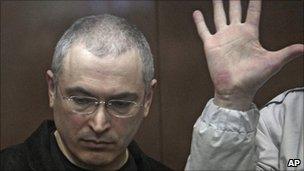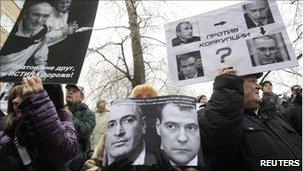The verdict that may shake Russia
- Published

The former oil tycoon was first arrested in 2003 on charges of tax evasion involving his company, Yukos
The most important court trial in modern Russian history has drawn to an end.
It is widely believed that by finding former oil tycoon Mikhail Khodorkovsky and his business partner Platon Lebedev guilty of embezzlement, the judge has ruled on something much more important than the fate of two defendants.
Many in Russia assumed that the outcome of the trial would foretell the result of the next presidential election in 2012.
According to this theory, an acquittal or even just a lenient sentence would indicate a possibility of incumbent Dmitry Medvedev serving another term.
A harsh sentence meanwhile would mean that his predecessor, current Prime Minister Vladimir Putin, is still calling all the shots and is determined to return to the Kremlin.
In his second tenure, liberals hoped, Mr Medvedev would try to get out of his powerful mentor's shadow and shake off some of the KGB-associated legacy that, to a great extent, has shaped the domestic and international policies of Russia in the past decade.
It is thought that Mr Putin's comeback, meanwhile, will entail further tightening of the screws and a prolonged period of enforced "stability" which, in the eyes of his critics, means nothing but all-permeating stagnation and corruption.
To illustrate the point protesters outside the court on Monday were holding two pictures of Mikhail Khodorkovsky: one with Mr Putin and the other with Mr Medvedev.
Former tycoon
Mr Khodorkovsky and his partner have been accused of stealing some $25bn (£16bn) worth of oil - or practically all the oil that their company, Yukos, produced in 1998-2000, and all the oil it exported in 2000-03, and then laundering the proceeds.
The prosecution is calling for a sentence of 14 years.
Independent jurists say they find the charge absurd. But plenty of observers said the same thing about many of the charges at the previous trial in 2005.
Last time, Mr Khodorkovsky and Mr Lebedev were found guilty of underpaying billions of dollars in taxes. The figure was so extraordinarily high that on appeal the Moscow city court slashed it six times while bizarrely reducing the length of the prison sentence by one year only - from nine to eight years.
Whatever its legal merit, very few people are prepared to take the new case against Mr Khodorkovsky at face value. Even the worst enemies of the former tycoon are convinced that he is in the dock for something else.
Interestingly, that seems to include Mr Putin himself: in one of his recent interviews the prime minister spoke in support of a lengthy prison sentence for the former billionaire, citing some other alleged crimes that the defendant has never been charged with.
And then, a few weeks later, he restated again that to his mind Khodorkovsky is a proven criminal and "should sit in jail", a statement denounced by critics as interference in the trial.
The hopes of acquittal were raised when President Medvedev seemed to openly contradict the prime minister, publicly stating his view that no official should try to pre-empt the court's decision.
Some commentators went so far as to describe that as "a sensation", signalling "a major crack in the ruling tandem". This assumption has proved to be a gross exaggeration.
Stalinist tradition
Mr Khodorkovsky is not popular with ordinary Russians - they cannot forgive him for getting immensely rich in the 1990s.

Many see the guilty verdict as a strong indicator of the direction that Russia is going to take
But the selectiveness of Russian justice has registered by now - the public has realised that only those "oligarchs" who dare to stand up to the authorities have problems with the law.
Only 13% of those polled in September, external by Levada Center said they believed the charges, down from 29% in February. (Roughly twice as many, 24%, said they did not believe the charges.)
Mr Khodorkovsky made a lot of enemies among the ruling elite and his fellow businessmen by insisting early this century on adopting Western standards of transparency for his businesses while the rest continued to cloak their affairs in secrecy.
It is rumoured that he made another fatal mistake by refusing to "share" his huge earnings with the powerful bureaucrats who are used to regular backhanders, something meekly accepted by the Russian business community as a necessary evil.
In other words, Mr Khodorkovsky challenged the very foundations of the oligarchic system, the symbiosis of power and wealth that makes Russia what it is now.
And then, on top of all that, he offered financial support to opposition political parties in order, as he put it, to develop pluralism in the country. And that, probably, was the last straw.
There were hopes that in order to preserve his sound professional reputation judge Viktor Danilkin could go against the grain.
Had he acquitted the defendants, it might have created a powerful precedent greatly encouraging all those who want to see their country change. In the end it did not happen.
It is not easy to break the deeply-rooted Stalinist tradition of seeking to satisfy the nation's rulers while disregarding the facts or intricacies of the law.
Some have even noticed the irony: Russia seems to have returned to the days of second trials that were common in Stalin's days: sending people back behind bars when their release became imminent.
Many see the guilty verdict as a strong indicator of the direction that Russia is going to take.
"This sentence will determine a lot if not everything in the development of our political and social situation as we all desperately need real justice and independent courts," said Leonid Parfenov, one of the most popular Russian television presenters.
To Mr Khodorkovsky himself the ruling apparently did not come as a surprise.
He was seen indifferently reading a book in his glass-and-steel cage while the judge went on reading out the long verdict.
"I am ready to die in jail," he said in his last word to the court in November, while strongly reiterating his innocence.
Not everybody took the verdict as a defeat. Some of the former businessman's supporters believe that such an openly biased trial and verdict will dramatically increase his popularity.
"Khodorkovsky is the name of the next Russian president," said a post on a popular Russian Twitter feed.
- Published15 December 2010
- Published2 November 2010